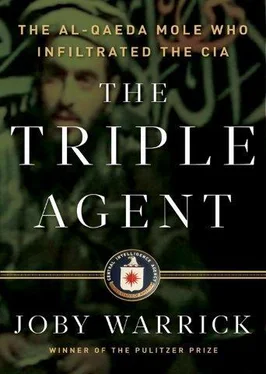By 2007 al-Qaeda’s ability to wreak havoc nearly rivaled the group’s pre-2002 peak. In some ways, the threat was even worse: Al-Qaeda had effectively merged with some of Pakistan’s extremist groups, while spawning new chapters in North Africa, Iraq, and the Arabian Peninsula. Al-Qaeda’s propagandists harnessed the Internet’s formidable powers to spread al-Qaeda’s hateful gospel to millions of Muslims through Web sites and chat rooms. New streams of cash and recruits spilled into northwestern Pakistan and to regional affiliates from Yemen to Southeast Asia. Many of the newcomers signing up for jihad carried Western passports and could slip undetected into American and European capitals. Some had blond hair and light skin.
What Hayden saw as he surveyed the world in early 2008 truly frightened him. So early that year, during his weekly intelligence briefings at the White House, he began to make the case to President George W. Bush.
“This is now a bona fide threat to the homeland,” Hayden told the president during one Oval Office visit. Another September 11–style terrorist strike was inevitable, he said, and it would come from the tribal region of Pakistan.
To prevent such an attack, the United States must take the fight to the enemy, Hayden argued. That meant attacking al-Qaeda on its home turf inside Pakistan, disrupting its communications, killing its generals and field commanders, and depriving it of sanctuary. Only the CIA had the legal authority to reach targets deep inside Pakistan, and the agency already possessed the perfect weapon, the Predator. It was time to take the fetters off the CIA’s fleet of unmanned hunter-killer planes, he said.
Bush and his advisers listened sympathetically. The problem, everyone knew, was Pakistan. Islamabad was a crucial ally, and it officially opposed foreign missile strikes on its soil, no matter the target. Pakistani officials argued that American air strikes only worsened the terror problem by radicalizing ordinary Pakistanis and driving more of them to join with the extremists—a concern shared by some U.S. terrorism experts as well. In private discussions, Pakistani intelligence officials chided the Americans for what they perceived as two dangerous obsessions: an overdependence on expensive technology, and an absurd fixation on the person of Osama bin Laden.
“Al-Qaeda is not very strong, but you’ve made it into a ten-foot-tall giant,” one senior Pakistani government official recalled telling a visiting Bush administration delegation. “How can a handful of core al-Qaeda leaders seriously threaten the greatest empire in the world?”
Eventually, Pakistani leaders agreed to allow a limited number of Predator strikes, and for months Washington and Islamabad engaged in an awkward dance over when an attack was permissible. If the CIA discovered a potential target, the agency could pull the trigger only after both governments agreed. In practice, it rarely happened. “If you had to ask for permission, you got one of three answers: either ‘No,’ or ‘We’re thinking about it,’ or ‘Oops, where did the target go?’ ” said a former U.S. national security official who was involved at the time. A whole year passed without a single significant success against al-Qaeda on its home turf. “We’re at zero for ’07,” Hayden complained to the White House.
After months of debate Bush decided in July 2008 to give the CIA what it wanted. News reports later characterized the policy change as an informal agreement by Pakistan to allow more U.S. air strikes in remote tribal regions that were largely outside of Islamabad’s control. In reality, the shift was much simpler: The CIA stopped asking for permission. The new policy, communicated to Pakistani officials in a meeting that month, required only “simultaneous notification” when the strikes occurred.
Over the next six months Predators hit targets in Pakistan thirty times, more than triple the combined number of strikes in the previous four years.
U.S. elections in November 2008 signaled the coming end of Republican control of the White House and likely Hayden’s tenure at CIA. But in the final weeks, as the clock ran down on the Bush presidency, the number of Predator strikes soared, prompting speculation within the agency that Hayden was hoping to flush Osama bin Laden himself out of hiding as the Bush administration’s final payback for September 11. It was amid the scramble for big targets in the final days of 2008 that a familiar name popped up in one of the agency’s phone intercepts.
The name belonged to an East African man named Sheikh Ahmed Salim Swedan, a midlevel al-Qaeda operative linked to several terrorist bombings. But Swedan was most interesting because of whom he worked for, the former soccer player known as Osama al-Kini, now the senior al-Qaeda commander in Pakistan. The two men had been on a bloody two-year rampage, killing hundreds of people in a series of increasingly spectacular attacks in Pakistani cities. On January 1, 2009, they were preparing to take their brand of mass murder on the road.
All by himself, Swedan would have made a worthy target. At the time he stumbled into the CIA’s surveillance net, he was on the most wanted lists for both the CIA and FBI and had been indicted in New York for assisting the 1998 bombings of U.S. embassies in Kenya and Tanzania. His apparent hideout in late 2008—an abandoned girls’ school on the outskirts of a village called Karikot—had also drawn keen interest. The CIA’s informants identified the building as a training academy for al-Qaeda’s bomb makers.
Hayden mulled his options and decided to wait. As important as he was, Swedan was only a deputy, and he wasn’t going anywhere. On the morning of January 1 he was under constant surveillance, not only by CIA operatives on the ground but also by a pair of Predators flying above the village. Sooner or later Swedan would have to communicate with his boss, and then Hayden would have a much bigger prize.
The CIA had been waiting for such an opportunity for more than a decade. Like his deputy, Osama al-Kini was also linked to the 1998 African bombings and had a five-million-dollar bounty on his head. Slim and athletic with tightly curled locks, al-Kini had been part of Osama bin Laden’s entourage since the early days and had been promoted to operations planner. By 2007 he was al-Qaeda’s top regional commander for all of Pakistan, and he was good at his job. His cell assisted the Pakistani Taliban in the assassination of former prime minister Benazir Bhutto and carried out bombings and suicide attacks against police stations, army camps, a civilian court, and a naval academy. Then, in September 2008, he achieved something far more ambitious, a massive truck bombing at Islamabad’s luxurious Marriott Hotel. The blast killed more than fifty workers and guests, wounded two hundred others, and made headlines around the world.
Al-Kini was now muscling his way into al-Qaeda’s senior ranks while putting his personal stamp on the organization. Aggressive and charismatic, he was popular with the group’s younger fighters, and he was beginning to pose a challenge to al-Qaeda’s more experienced leaders, particularly a commander named Sheikh Saeed al-Masri, a cruel-tempered Egyptian who controlled the group’s purse strings and claimed the top leadership spot after Zawahiri. Most ominously, al-Kini was preparing to go international, dispatching some of his top trainees to Western Europe. CIA officials concluded that the Kenyan was attempting to lay the groundwork for a network of terrorist cells across Europe that could begin casing major hotels and other landmarks for future attacks.
It was this threat that weighed most heavily on Mike Hayden on January 1 as he waited for news from northwestern Pakistan. The CIA director had not yet fallen asleep when the phone rang at 10:30 P.M. with fresh word from the hunt. Hayden rolled out of bed and trudged to his basement office to get on a secure phone line.
Читать дальше












